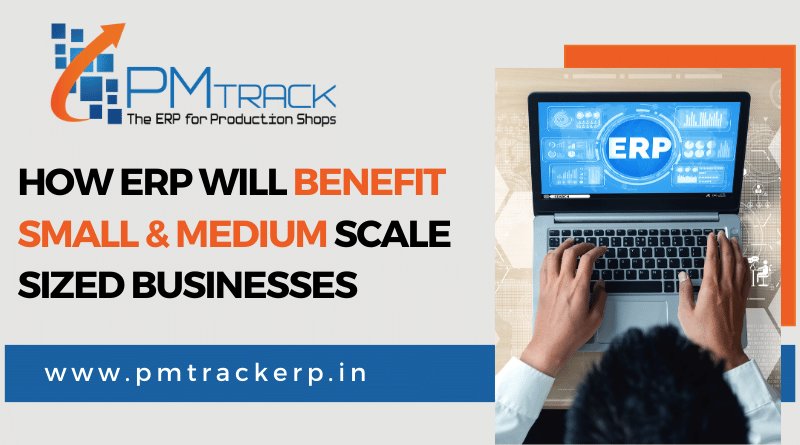How ERP Will Benefit Small & Medium Scale Sized Businesses
An ERP system can help forecast demand for specific materials, decrease overstock, and track real-time supply. PMTrack is one of the leading ERP solution providers in Pune. We provide the best online ERP software that will help you in improving your business procedures.

Manufacturers can track all supply chain movement with an ERP system. Remedial actions can be taken to ensure the smooth flow of manufacturing activities by identifying processes that can cause production disruption.
ERP software is management software for small and medium-sized businesses that enables them to control a suite of integrated applications. ERP systems automate and streamline processes, resulting in a more lean, more precise, and more efficient operation. ERP provides a comprehensive view of central business processes.
Integrated Production and Planning on the Shop Floor In order to provide real-time coordination across all business verticals, functions with sales orders, inventory, purchasing, and Supplier Management, accounting, and financial reporting play a crucial role.
Key Benefits of ERP Solutions for SMEs
1. Efficient Flow of Information
ERP technology helps to automate monotonous tasks and workflows to minimize the errors created due to manual practices and also boost the efficiency of the business process. It leads to instantly improves data accuracy, better teamwork, and operational visibility for small and mid-sized businesses.
2. Operation Cost Reduction
On-premises ERP systems involve enormous setup expenses and infrastructure to get started. These days, small businesses prefer to select affordable cloud-based ERP solutions so that they can avoid the need for supplementary hardware, maintenance, IT staff, and upgrades.
3. Customize Reporting
ERP software’s ability to custom report creation on a schedule is powerful. Large companies rely on reporting to track KPIs across the entire business. It helps to produce useful reports of your business because you can’t produce without a system to compile all that information. There’s no other way to know what time it takes from start to finish the manufacturing process if your staff isn’t tracking each and every process from inventory management, and production, to shipping and delivery.
4. Highly Scalable Production
ERP systems are flexible in nature; hence each application can be easily implemented together or stand-alone. ERP is a game-changer in terms of scalability to business processes.
If a company depends on manual processes for order fulfillment, how can the employees deal with the growth surge requirement? How will they boost the productivity volume they’re accustomed to?
As the volume will increase, it is because of growing trouble for any business, and ERP can help you to reduce the impact. The automation facility will take much of the burden off employees for a definite better record of workflow. That decreases the burden of your most valuable resource and the staff can invest their efforts on something else.
5. Supply Chain Management
ERP systems combine and deliver global visibility into supply chain data, and provide businesses with a holistic, actual picture of performance so they can speedily take informed decisions to improve operation ability and respond to challenges. ERP software also automates essential supply chain functions, fast-tracking responsiveness although reducing the managerial load and human error risks.
6. Improved Data & Cloud Security
ERP systems provide data security for your business. Also helps to avoid business software failures as the ERP work as attack prevention, and also provides advanced security. Cloud security guarantees your data and applications are freely available to authorized users. ERP software always will give the advantage to have a trustworthy process to access your cloud apps and information, as well as allowing you rapidly take action for any possible security issues.
Challenges Manufacturing Industries are Facing
- Less Quantity of Skilled Labor
One of the main challenges that manufacturing industries face is the lack of skilled labor is a lack of skilled labor.
What is the actual problem? Young people misjudge the industry, and older workers and staff are retiring. According to The Manufacturing Institute, the extent of workers in manufacturing will increase by retiring in the next ten years.
- Inventory and Project Management
Handling Inventory management and your ground-level management will always affect the factory floor when you are trying to complete your orders while running a business.
If you think that these facets of manufacturing are irrelevant. But, it will directly affect your manufacturing orders and sales if you are failed to be on top of your inventory management.
- Direct deal with the consumers:
One of the other manufacturing tough tasks is related to consumer trends as the issues involved with selling straight to consumers. As you are aware, more people go to e-commerce for purchasing products. Manufacturing industries have been able to cut out the middleman and sell the products by themselves.
Unfortunately, more control means more responsibility with higher risk. Even with the many challenges brought in the manufacturing industry, there is essential growth in this industry in the last two years.
Even those liking growth will remain to face challenges in the manufacturing industry in some years ahead. Keep reading some more about the greatest challenges that manufacturers face.
- Industry Worker Safety
Manufacturers have an intensified awareness in terms of protecting their workers from possible health risks. Ensuring their physical safety from fall dangers remains to be a priority. But, understanding that an eruption of illness could harm their already fewer workforces and stopover production, employers are equally afraid of reducing infection risk.
How ERP System Improve Productivity?
ERP solution helps to automate those monotonous tasks and allows the employees to concentrate on other tasks by providing additional time that to get more output from their probabilities. Eventually, where tasks can be automated, the staff can be used to get more productivity.
Enterprise Resource Planning is a customized system for managers, programmers, and decision-makers. The system identifies the importance of the utmost junior employee, and they have a role as end users. The employee is the people who do data entry work such as in the sales department, clerk enters customer data such as name, age, mobile number, email id, address, and other purchase details to create a sales order, and afterward the bills.
ERP software plays an important role in terms of improving the project management of a company.
Business project management ERP software is able to manage everything from consumers to schedules to workers and invoicing.
This ERP project management software makes sure that all of the tasks are completed in the required time.
Conclusion
PMTrack ERP is the ERP software services provider for various industries. The ERP software provides a complete Project Management as well as Inventory Management solution for your business.
To succeed in today’s increasingly competitive business environment, you must implement systems that allow you to efficiently streamline, automate, and scale. While implementing a new ERP system is a significant change for any SME, the benefits are immediately apparent.
Contact PMTRACK ERP to assist you in installing dedicated custom ERP software to reap the long-term benefits for your business.












